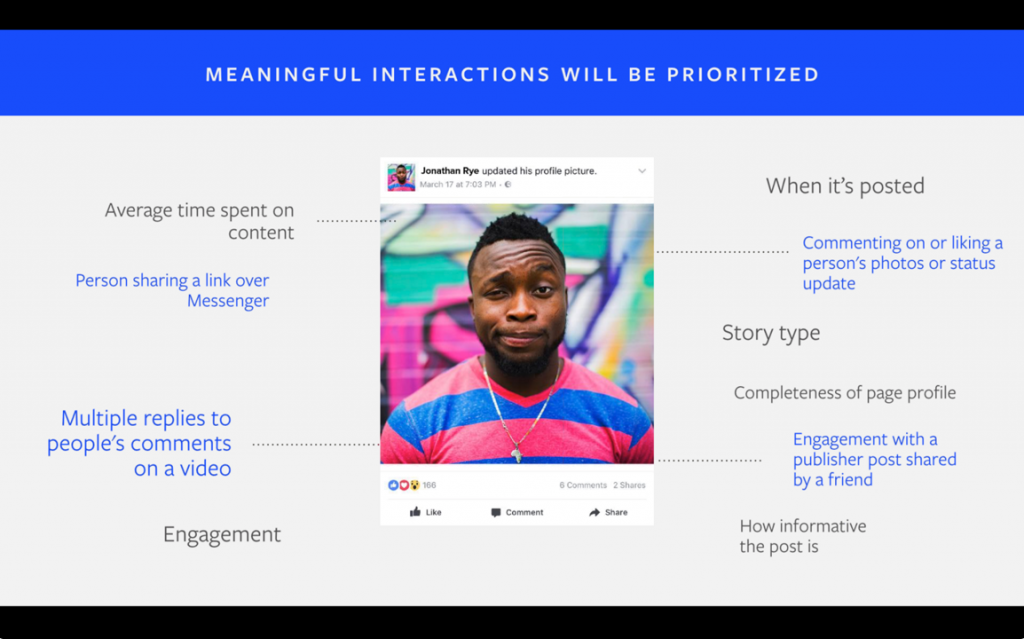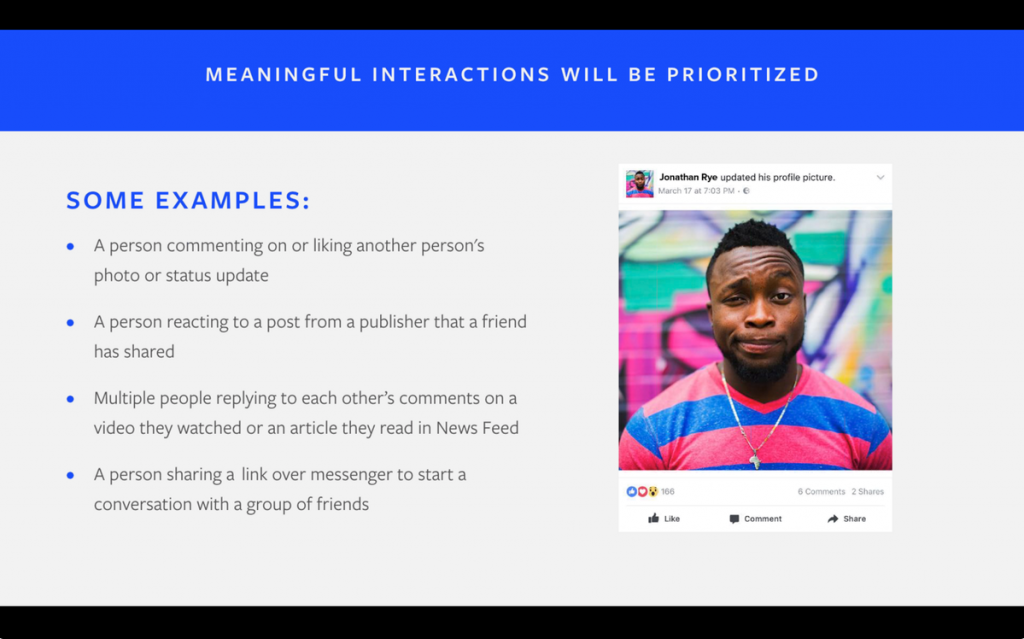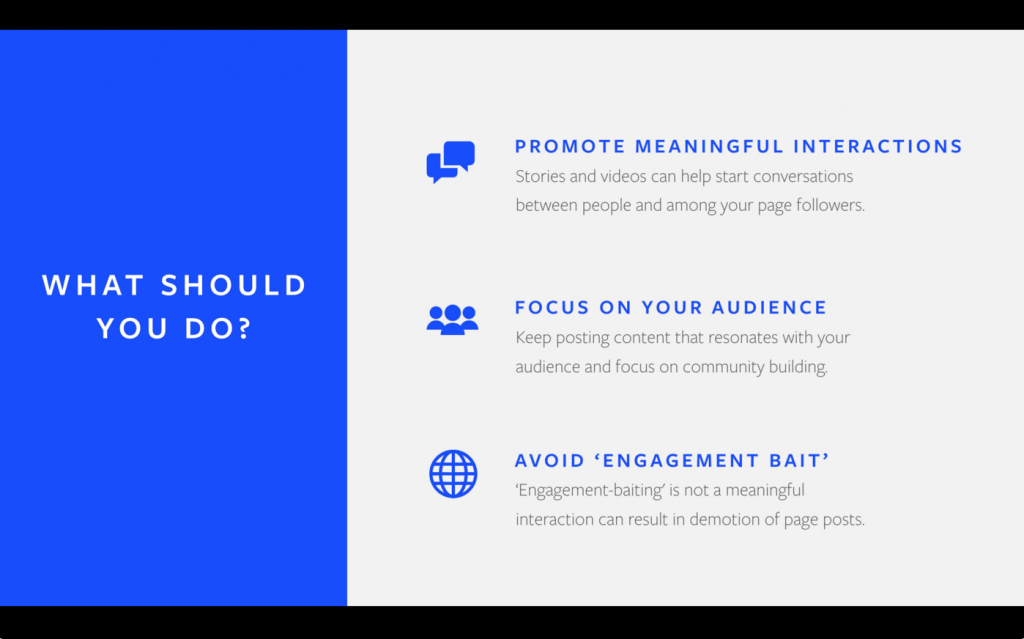I stumbled across algorithm change insight gold this morning in the form of a series of screen grabs from a private webinar on News Feed updates from the new Facebook Journalism Project. The Next Web’s Matt Navarra had tweeted the screen grabs (those I am showing here are from his Twitter account) and I’ve also managed to find a set of detailed notes from the webinar that Ned Berke has compiled.
Together these shed light on what the algorithm changes mean for Pages, and in particular news publishers.
What content is prioritised by the News Feed algorithm?
Firstly, light was shed on some of the key ranking signals that the News Feed algorithm utilises. Those in blue below are considered the most important:

I’m struck by a number of things here:
- Time spent on content
Facebook is well aware how long you spend reading a post, watching a video, following a link to a third party website, even hovering with your scroll thumb paused over an update.
What can you do to increase time spent? Consider long form content that keeps people reading or viewing, updates that provoke comments and replies, videos where people simply HAVE to wait for the conclusion. - Link shares over Messenger
Shares have always been used as a quality indicator but we’ve tended to think of them as timeline shares. Sharing links on Messenger (certainly something I do on a daily basis) are now algorithm hot property. - Commenting on or liking a person’s photos or status update
The key point to note here is ‘person’ rather than ‘Page’. This is the newish friends and family focus. The engagement of Friends (deliberately capitalised here) is prioritised for News Feed visibility. - Engagement
Note how this is not in blue. Merely liking or emoji-reacting to a post is no longer the indicator it once was.
However engagement with a publisher post that is shared by a friend is highlighted. This is good old viral reach and posts that enjoy lots of peer-to-peer engagement (replies within comments) will do well hence the highlighted “Multiple replies to people’s comments on a video”
We know too from comments by Head of News Feed, Adam Mosseri that more weight is given to longer comments.
This update is confirmed as being able to also discern between interaction between people vs interaction between a person and the Page. - Story type
A clear indication that not all content types are equal. Based on recent studies and general advice from Facebook I’d suggest that Live video still tops the pile and links are somewhere near the bottom in terms of how the algorithm ranks for priority. But remember that what PEOPLE do with your content is more important than content category. - Completeness of Page profile
I’ve long said that Facebook prefers Pages with complete About text and this confirms it.
I’d also suggest that it is worth publishing the “Our Story” option that is offered on the right hand nav (on desktop) nowadays. Do make sure you check and actually hit publish on this as what you see as an Admin isn’t visible to the public until then. I’m rather pleased with our version. [Note that this is not a Facebook Story as in Instagram Story and it is not a Story as in a piece of content. Not confusing at all is it?!] - When it’s posted
No surprise that recency is still a big factor.
What, according to Facebook, are meaningful interactions?

Interactions are all about conversations. Mere likes are a relatively passive reaction. To-and-fro conversation is the ultimate goal here.
The upshot from this is that users are likely to see less content from Pages and more content from people they are connected to.
What is shown from Pages and publishers will be from trusted sources sharing high quality news that is deemed of relevance to the user. And rolling out is an emphasis on local news.
What is Facebook’s advice for Pages and Publishers?

Engagement bait is singled out as a tactic to avoid. We were contacted by a Page admin recently who said that Facebook had “destroyed” her Page. I investigated and realised that she had been totally reliant on engagement bait to drive reach and engagement. Her average post reach has dropped from 140% (yes you read that right) to below 2%. I’ve written it up in an algorithm update case study. Take note: Pages using reactions as voting mechanisms or asking for Likes, Comments and Shares will be penalised.
Here’s a lovely example I screen grabbed earlier of a Page promoting meaningful reactions (guilty pleasure klaxon alert):
This will mean nothing to you if you are not a fan of long-running radio soap The Archers but for fans this simple question is totally on the money. This kind of content creates community: the fans share a common interest and get to confess how that works out in their day-to-day lives.
The response (see below) was huge in comparison to other posts on the Page. Lots of fan-to-fan conversation and, in these early posts, the Page gently encouraged input by responding to comments:
Helpful?
As someone who has been immersed in the algorithm (from a Page admin, Facebook trainer and academic researcher) for many years I’m excited to see these clarifications from Facebook. Many chime with the principles I’ve taught for years already. I’m glad to see engagement bait really being dealt with. I hope the next target is Pages that run competitions that break Facebook’s terms of service (i.e. asking for Shares).
But I also think it’s sad for users when they see little from Pages that they have chosen to follow unless they opt for the See First or Get Notifications options. These, to me, seem like overkill.
I’d prefer a traffic light approach to content from Pages and Friends. Red for unfollow, Amber for ‘show me what’s popular’ and Green for ‘show me everything’.
But what do you think?
- How to set up appointments on your Facebook Page - 19th March 2019
- Social media content idea: WordSmith Cards - 11th March 2019
- Facebook for small businesses in 2019: a Q&A - 7th March 2019
- Is it best to boost a post on Facebook, promote a post or create an ad? - 13th October 2018
- What is the difference between a boosted post, a promoted post and a Facebook ad? - 13th October 2018
- How not to £@%!-up on social media! - 24th September 2018


